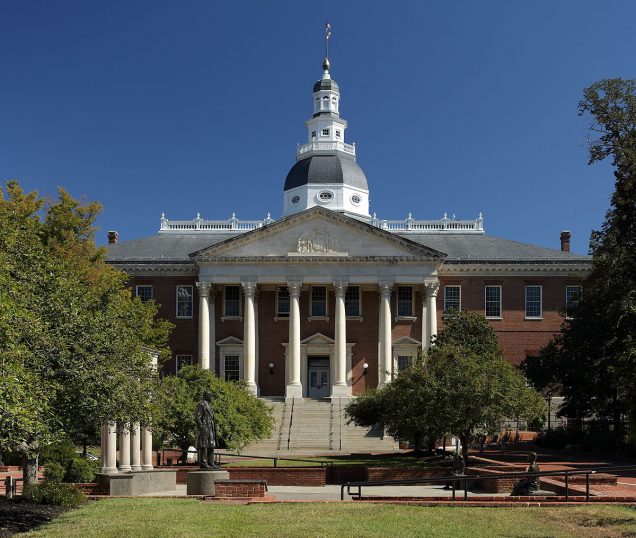Tagged: First Amendment
Is the Johnson Amendment Constitutional?
My previous Dome blog entry discussed the Johnson Amendment and the fight that has surrounded the amendment since its creation in the 1950s. The Johnson Amendment was added to Section 501(c)(3) of the U.S. tax code by then-Senator Lyndon B. Johnson to limit the political activity of 501(c)(3) organizations. The Amendment prohibits 501(c)(3) organizations from endorsing or opposing political candidates. Many organizations have been trying to repeal the Johnson Amendment for years, and many argue (including members of Congress) that it violates the First Amendment of the U.S. Constitution.
Two vocal opponents of the Johnson Amendment (and the sponsors of the Free Speech Fairness Act in both houses of Congress) Senator James Lankford and Congressman Steve Scalise argue that the Amendment must be repealed to protect the First Amendment rights of 501(c)(3) non-profit employees. They argue the Bill of Rights protects the right of all Americans to freely express their ideas and opinions without persecution from the government, and the Johnson Amendment violates this right by stripping 501(c)(3) employees from being able to speak their minds about political issues. As discussed in my previous post, the Johnson Amendment prohibits 501(c)(3) employees from endorsing or opposing candidates, and violations of the Amendment risks punishment by the IRS either by fine, revocation of the organization’s tax-exempt status, or both. This, therefore, begs the question of whether the Johnson Amendment does in fact violate the First Amendment. This Dome blog post will look at legal precedent to see if the Amendment has been challenged for its constitutionality in the past, and if so, the arguments the court made in their decision.
Before going into court cases about whether or not the Johnson Amendment actually violates the First Amendment, it is important to look at the text itself. The text of the First Amendment reads:
“Congress shall make no law respecting an establishment of religion, or prohibiting the free exercise thereof; or abridging the freedom of speech, or of the press; or the right of the people peaceably to assemble, and to petition the government for a redress of grievances.”
Members of Congress and other organizations who oppose the Johnson Amendment mainly argue that it violates the freedom of speech, which is in fact why the current bill before Congress attempting to repeal the Amendment is titled the “Free Speech Fairness Act.” Within the text of the First Amendment, they argue that the Johnson Amendment is “abridging the freedom of speech” of 501(c)(3) tax-exempt nonprofit employees, but in particular religious ones, such as pastors, priests, and rabbis.
But has the constitutionality of the Johnson Amendment actually been determined by the Supreme Court as it applies to religious organizations? The answer, unfortunately, is no. However, two U.S. Court of Appeals circuits have upheld the Amendment as constitutional in the past when applied to religious organizations. The first case, Christian Echoes Nat’l Ministry v. United States (1972), involved a nonprofit religious corporation contesting the revocation of its 501(c)(3) tax-exempt status by the IRS as punishment for violating the Johnson Amendment. Through various appeals and remands, the ultimate holding by the Tenth Circuit Court of Appeals was that the organization no longer qualified as a tax exempt organization under section 501(c)(3) of the tax code. As one argument against the revocation of their status, Christian Echoes argued the Johnson Amendment was unconstitutional and violated their right to free speech. However, the court held that “in light of the fact that tax exemption is a privilege, a matter of grace rather than right… the limitations contained in Section 501(c) (3) withholding exemption from nonprofit corporations do not deprive Christian Echoes of its constitutionally guaranteed right of free speech.” Christian Echoes Nat’l Ministry v. United States, 470 F.2d 849, 857 (10th Cir. 1972). The court therefore determined the taxpayer must refrain from these political activities to obtain “the privilege of exemption,” which Christian Echoes benefited from until their status was revoked.
The argument made by the court in Christian Echoes is very similar to the argument made by proponents of the Johnson Amendment, such as the Freedom From Religion Foundation, who argue because religious organizations benefit essentially from a government subsidy, in exchange for that subsidy they relinquish some of their rights. These rights can at any time be reclaimed, but at the cost of losing the subsidy, ultimately leaving the choice between the two up to individual organizations.
The District of Columbia Circuit Court of Appeals has also taken up this issue more recently in Branch Ministries v. Rossotti (2000), regarding the constitutionality of the Johnson Amendment, but for violation of a different part of the First Amendment. In this case, a church had its tax-exempt status revoked for intervening in political campaigns, violating the Johnson Amendment. The church argued that revoking their tax-exempt status was a violation of the Free Exercise clause of the First Amendment, as in violating their right to freely exercise religion. To show the Free Exercise clause had been violated, the church had to establish their “free exercise right has been substantially burdened.” Branch Ministries v. Rossotti, 211 F.3d 137, 142 (2000). The court, however, held the Johnson Amendment did not violate the First Amendment because the church failed to establish that their free exercise right had been substantially burdened. Despite the claim by the church that by revoking their tax exempt status would threaten its very existence, the court determined this was overstated because the impact of revocation “is likely to be more symbolic than substantial,” because if they stop intervening in political campaigns they can regain their tax-exempt status, and even if they do not, “the revocation of the exemption does not convert bona fide donations into income taxable to the Church.” Therefore, the burden is not substantial enough to be considered a violation of the First Amendment. See, Branch Ministries, 211 F.3d at 142-143.
It seems currently that courts are finding the Johnson Amendment does not, in fact, violate the First Amendment. The Supreme Court has said in the past they believe tax benefits nonprofits are given are “a form of subsidy that is administered through the tax system,” which seems in line with the view of supporters of the Johnson Amendment and these two Court of Appeals cases. See, Regan v. Taxation with Representation, 461 U.S. 540, 544 (1983). They have not, however, delivered a decision on the constitutionality of the Johnson Amendment as it applies to religious organizations. Therefore, despite the Court of Appeals cases, the fight over this issue is unlikely to end until the Supreme Court formally rules on the Johnson Amendment as it applies to religious organizations once and for all.
 Kate Lipman anticipates graduating from Boston University School of Law in May 2021.
Kate Lipman anticipates graduating from Boston University School of Law in May 2021.
Making Big Tech Pay Their Share: The Taxation of Digital Advertising in Maryland
In sharp contrast to the bevy of tax incentives offered to Amazon as part of a bid for the so-called “HQ2,” Maryland has charted a path towards taxation of technology companies as part of its commitment and obligation to its residents. This move to hold large companies accountable for the money they derive from Maryland residents is laudable, given the amount of data mined from individuals and used to sell targeted digital advertising as well as the crisis of state budget shortages. However, as written, Maryland’s efforts raise serious legal concerns that jeopardize the viability of the current iteration of the bill. The bill draws on an existing model to achieve important social goals. However, in the context of the American legal framework, the current iteration of the bill raises First Amendment freedom of speech concerns and faces further challenges under the commerce clause and federal legislation enacted to promote and facilitate Internet commerce. These shortcomings need not be fatal, though. With modest redrafting, the policy underlying the bill could be implemented in order to fulfill Maryland’s goals.
The bill
Introduced in the Senate as Senate Bill 2 and in the House as House Bill 695, parallel bills in the Maryland legislature impose a
tax on gross revenues derived from digital advertising. The amount ranges from 2.5% for a corporation with annual gross revenues from $100 million to $1 billion up to 10% for those with gross revenues over $15 billion. The revenue raised will go to the Blueprint for Maryland’s Future Fund, which funds K-12 education improvements in the state. This policy, though lauded as the first attempt to tax digital advertising revenues in the United States, is not without global precedent. Rather, it is modeled after a French law, which levies a 3% tax on digital interface and “targeted advertising services” in France. The tax only applies to companies with global revenues from digital interface and targeted advertising of more than €750 million globally, with at least €25 million of which was derived from French users. France enacted this legislation July 11, 2019, and was quickly rebuked by the American business community. In particular, President Trump threatened countermeasures of tariffs up to 100% on $2.4 billion worth of French imports to the United States, including sparkling wine and cheese. As a result, France and the U.S. negotiated a pause on the enactment of the law on the condition that the threatened tariffs not go into place.
Like its French model, Maryland’s bill specifically targets large technology companies. The Fiscal and Policy Note for the Maryland bill calls out by name Alphabet (the parent company of Google), Facebook, and Amazon. Proponents suggest that this legislation will force tech companies to “pay their fair share” by contributing to local tax bases rather than reaping the benefits while paying only minimal tax obligations. However, the opponents are not without their own ammunition. As part of their strategy to defeat the underlying policy, they raise legal questions regarding the current drafting and scope of the bill.
Legal considerations
Opponents argue that the selective taxation represents a content-based restriction on free speech because it selectively targets some kinds of advertising based on its communicative content. Following the recent Supreme Court case of Reed v. Town of Gilbert, which expanded the category of what is considered a content-based restriction on speech, this kind of selective taxation could be viewed as falling into the category of speech subject to strict scrutiny and therefore unlikely to survive judicial review. Even as an exercise of commercial speech, subject only to intermediate scrutiny under Central Hudson Gas & Electric v. Public Service Commission, such a tax is unlikely to be sustained. Restrictions on commercial speech must be no broader than necessary to directly further a substantial government interest. Under these circumstances, improving K-12 education is likely a substantial government interest, but the program could not be considered narrowly tailored. There are other means of raising the necessary revenue without burdening commercial speech of only large technology companies.
 Maryland’s tax also raises other, non-First Amendment concerns. As written, the bill could be construed as a violation of the commerce clause of the Constitution, because it would create the possibility of double taxation of the same single economic activity if every state were to adopt a similar regime, violating the “internal consistency” test. A final source of legal concern for the policy is the Permanent Internet Tax Freedom Act, or PITFA. PITFA prohibits state taxation of internet access as well as discrimination against online commerce. The taxation of digital advertising, but not traditional forms of advertising, could be seen as a discrimination against online commerce in violation of PITFA.
Maryland’s tax also raises other, non-First Amendment concerns. As written, the bill could be construed as a violation of the commerce clause of the Constitution, because it would create the possibility of double taxation of the same single economic activity if every state were to adopt a similar regime, violating the “internal consistency” test. A final source of legal concern for the policy is the Permanent Internet Tax Freedom Act, or PITFA. PITFA prohibits state taxation of internet access as well as discrimination against online commerce. The taxation of digital advertising, but not traditional forms of advertising, could be seen as a discrimination against online commerce in violation of PITFA.
Looking forward
The French example and advertising industry outcry against the Maryland proposal suggest that taxation of digital advertising will be a difficult prize to win. Significant political, economic, and legal hurdles remain. However, in an era of declining state revenues and K-12 funding crises, novel solutions must be sought. The digital advertising industry, reaping incredible profits, represents a tempting source of revenue for states dealing with these demands. However, as constructed, the policy presents serious legal shortfalls. This is not to say that the taxation of a major economic activity ought to be abandoned as a policy proposal. Rather, the specific construction of the statute needs to be reconsidered as the Maryland legislature moves forward. For example, a modification in the way that “in the state” is determined for the purposes of the tax could eliminate the concern of double taxation and, therefore, the commerce clause concerns. Where modest redrafting could save the policy from its legal challenges, it seems imperative to do so given the high stakes underpinning the policy.
 Jordan Neubauer anticipates graduating from Boston University School of Law in May 2020.
Jordan Neubauer anticipates graduating from Boston University School of Law in May 2020.




